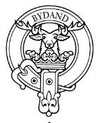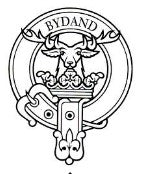
Clan Gordon
Crest:Issuant from a crest coronet Or a stag's head (affrontée) Proper attired with ten tines Or (Rising from a gold crest coronet, a stag’s head with ten gold tines).

Motto: Bydand (Translations: Biding, Remaining, Steadfast)
Tartan:As with many clans, Gordon has several recognised tartans. Gordon Dress is shown here.

Clan Chief:
Granville Charles Gomer Gordon, 13th Marquis of Huntly, Earl of Enzie, Earl of Aboyne, Lord Gordon of Badenoch, Lord Gordon of Strathavon and Glenlivet, Baron Meldrum of Morven.
The Chief of Clan Gordon is also traditionally known as The Cock o' the North. The current Gordon seat is Aboyne Castle in Aberdeenshire.
A few highlights:
It is thought the Gordons originated in Normandy; the earliest appearance of the name in Scotland was late in the 12th century, when Richard de Gordon was Lord of the Barony of Gordon in the Merse, Berwickshire. In 1270, Adam de Gordon, an Anglo-Norman, was with King Louis XI of France in the Crusades. Clan Gordon supported Robert the Bruce in the Wars of Scottish Independence and fought at the Battle of Halidon Hill in 1333. Over the 15th century the Gordons became one of the most powerful clans, with James IV visiting Huntly Castle, the Gordon historic seat (known as Strathbogie Castle until 1544). Continuing through the 16th, 17th and 18th centuries Gordon fortunes fluctuated – there were feuds with many other clans and consequent political machinations, often with Gordon clan members on both sides of a dispute - for example, in the Jacobite rising of 1745-46, Cosmo Gordon (3rd Duke of Gordon) supported the British government but his brother, Lord Lewis Gordon, raised two Jacobite regiments against the British. The Gordon Jacobites fought at the Battle of Inverurie (1745), the Battle of Falkirk (1746) and the Battle of Culloden (1746). Cosmo escaped to France after the Battle of Culloden.
Two British regiments called the "Gordon Highlanders" have come from Clan Gordon. The "81st" was formed in 1777 by the Hon. Colonel William Gordon, son of the Earl of Aberdeen, but disbanded in 1783 and in 1794, the "92nd Regiment of Foot” was formed by Alexander, 4th Duke of Gordon. The 4th Duke was described by Kaimes as “the greatest subject in Britain”; becoming a peer of the United Kingdom in 1784, he was a Knight of the thistle and Lord keeper of Scotland. He raised his regiment to take part in the American war, and his wife, the “Gay Duchess of Gordon” helped in the recruitment. In 1881, as part of the Childers Reforms, the regiment merged with the 75th (Stirlingshire) Regiment with the combination known as “The Gordon Highlanders”. Further amalgamations mean that since 2006 it has been incorporated with the Royal Regiment of Scotland.
George Gordon, 6th Lord Byron, the poet, was as famous for his debts, excesses, love affairs and exile as his poetry, and was part of the Gordons of Gight. Gight, in Aberdeenshire, belonged to Byron’s maternal grandfather George Gordon of Gight, who was related to King James VI of Scotland and I of Great Britain. He attended Aberdeen Grammar School, one of the oldest grammar schools in Britain; his statue is in the courtyard.
The three main branches of the Clan are Gordon of Haddo, Gordon of Lochinvar and Gordon of Strathbogie. There are numerous septs, including Adam, Adams, Adamson, Addie, Adie, Addison, Atken, Atkin, Atkinson, Connon, Cromb, Crombie, Cullen, Culane, Darg, Darge, Edison, Eddie, Edie, Gardiner, Gardner, Huntley, Huntly, Jessiman, Jopp, Jupp, Lawrie, Mallett, Mill, Mills, Miline, Milner, Morrice, Macadam, Teall and Todd.
For more details of the origins of Clan Gordon and its place in history, order a Gordon Clan book from Scots in Spirit at https://www.scotsinspirit.com/collections/clan-books/products/scottish-clan-books?variant=42777080396
Sources:
Martine, R. Scottish clans and family names. Edinburgh: Bartholomew & Son Ltd; 1987.
Scottish Tartan Authority (http://www.tartansauthority.com/)
Wikipedia
The great Scottish clans (http://www.greatscottishclans.com/clans/gordon.php)
Electric Scotland (http://www.electricscotland.com)
The great Scottish clans (http://www.greatscottishclans.com)






